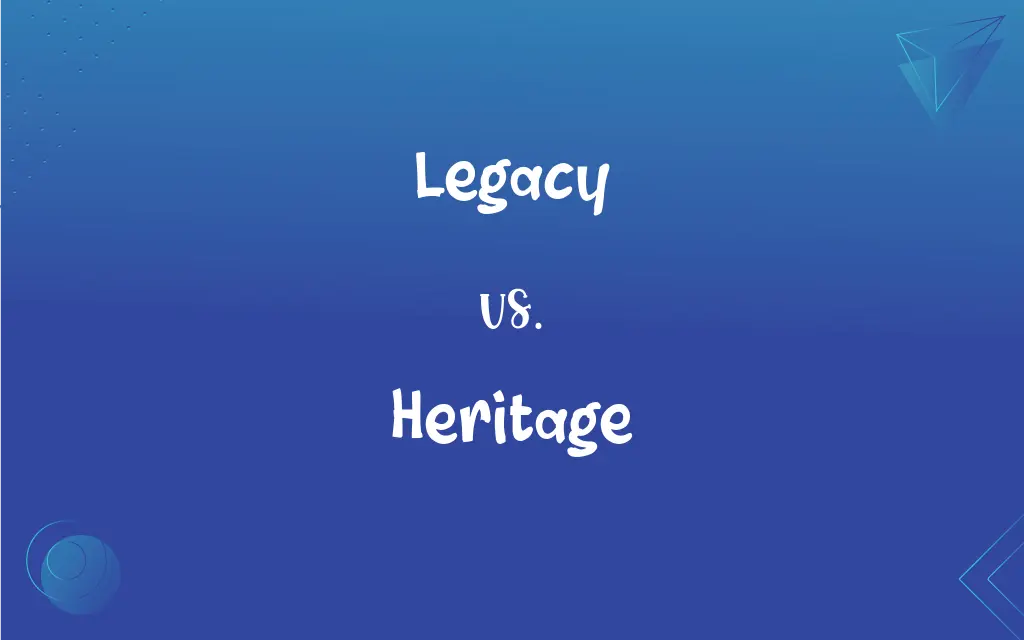Legacy vs. Heritage: What's the Difference?
Edited by Aimie Carlson || By Janet White || Published on November 10, 2023
Legacy refers to what is left behind or passed on, often in terms of assets or reputation, while heritage pertains to traditions, values, and culture inherited from previous generations.

Key Differences
Legacy and heritage are concepts often linked to the past and what is bequeathed to future generations. Legacy typically emphasizes tangible or intangible assets left behind or transferred. In contrast, heritage focuses on the inherited cultural practices, traditions, or historical sites.
While a person can leave a legacy in the form of wealth, knowledge, or reputation, heritage is a collective inheritance, rooted in shared culture, history, or ancestry. It can't be individualized in the same way a personal legacy can be.
Often, legacy has financial or material connotations, such as the assets left in a will. On the other hand, heritage has deeper cultural and societal implications, denoting shared customs, practices, and historical backgrounds.
Legacy might reflect one's personal contributions or impacts during their lifetime. Conversely, heritage is a broader concept that encompasses the shared experiences and traditions of a community or nation.
It's noteworthy to mention that while individuals can shape and leave their own legacies, heritage is typically something individuals are born into, deriving from their ancestors or their cultural community.
ADVERTISEMENT
Comparison Chart
Definition
What's left behind or passed on
Traditions and culture inherited
Tangibility
Often tangible assets or reputation
Intangible cultural aspects
Individual vs. Collective
Can be individual
Typically collective
Scope
Personal contributions or impacts
Shared experiences & traditions
Origin
From an individual or entity
From ancestry or cultural group
ADVERTISEMENT
Legacy and Heritage Definitions
Legacy
Something handed down from an ancestor or from the past.
Her grandmother's diary was a cherished legacy.
Heritage
Features or qualities passed down from previous generations.
The handcrafted furniture was a testament to their woodworking heritage.
Legacy
The outcome or effect of an event, person, or situation.
The mayor's legacy was one of reform and progress.
Heritage
Collective history, values, and practices of a community or nation.
The national park is a vital part of our country's heritage.
Legacy
An individual's lasting impact or contribution.
Her groundbreaking research became her professional legacy.
Heritage
Traditions, achievements, and values inherited from the past.
The cultural festival celebrated the town's rich heritage.
Legacy
Money or property given to another by will.
Heritage
Property that is or can be inherited; an inheritance.
Legacy
Something handed down from an ancestor or a predecessor or from the past
A legacy of religious freedom.
Heritage
Something that is passed down from preceding generations; a tradition.
Legacy
An individual who is either an applicant to an educational institution or a matriculated student and is the child of an alumna or alumnus.
Heritage
The status acquired by a person through birth; a birthright
A heritage of affluence and social position.
Legacy
Retained under an obsolescent or discarded system, chiefly for purposes of reference
Legacy files in the old email system.
Heritage
A domesticated animal or a crop of a traditional breed, usually not widely produced for commercial purposes.
Legacy
(legal) Money or property bequeathed to someone in a will.
Heritage
An inheritance; property that may be inherited.
Legacy
Something inherited from a predecessor or the past.
John Muir left as his legacy an enduring spirit of respect for the environment.
Heritage
A tradition; a practice or set of values that is passed down from preceding generations through families or through institutional memory.
Legacy
(education) The descendant of an alumnus.
Because she was a legacy, her mother's sorority rushed her.
Heritage
A birthright; the status acquired by birth, especially of but not exclusive to the firstborn.
Legacy
Left over from the past; no longer current.
Heritage
(attributive) Having a certain background, such as growing up with a second language.
A heritage speaker; a heritage language
The university requires heritage Spanish students to enroll in a specially designed Spanish program not available to non-heritage students.
Legacy
A gift of property by will, esp. of money or personal property; a bequest. Also Fig.; as, a legacy of dishonor or disease.
Heritage
That which is inherited, or passes from heir to heir; inheritance.
Part of my heritage,Which my dead father did bequeath to me.
Legacy
A business with which one is intrusted by another; a commission; - obsolete, except in the phrases last legacy, dying legacy, and the like.
My legacy and message wherefore I am sent into the world.
He came and told his legacy.
Heritage
A possession; the Israelites, as God's chosen people; also, a flock under pastoral charge.
Legacy
(law) a gift of personal property by will
Heritage
Practices that are handed down from the past by tradition;
A heritage of freedom
Legacy
A gift of property, especially personal property, as money, by will.
He left a sizable legacy to his children.
Heritage
Any attribute or immaterial possession that is inherited from ancestors;
My only inheritance was my mother's blessing
The world's heritage of knowledge
Legacy
A thing that is a result of events in the past.
The space program is a legacy of the Cold War era.
Heritage
That which is inherited; a title or property or estate that passes by law to the heir on the death of the owner
Heritage
Hereditary succession to a title or an office or property
Heritage
Property that descends to an heir.
The family estate became her heritage after her parents' passing.
Heritage
An inherited lot or portion.
The old folk tales were a heritage from their ancestors.
FAQs
Can one person have a unique heritage?
While individuals might have unique aspects related to their personal history, heritage typically refers to shared cultural or ancestral backgrounds.
What does legacy generally refer to?
Legacy often refers to what one leaves behind, either as assets, reputation, or impact.
Is heritage typically individual or collective?
Heritage is typically a collective inheritance, rooted in shared culture or history.
Can legacy be intangible?
Yes, a legacy can be intangible, like a reputation or a lasting impact.
What's a financial legacy?
A financial legacy pertains to assets or wealth left behind, often through a will.
Can a place have a heritage?
Yes, places can have heritage, often reflected in historical sites, customs, or traditional practices.
Can heritage be seen in tangible forms?
While heritage is often intangible, it can manifest in tangible forms like artifacts, landmarks, or inherited property.
Can one's actions change their legacy?
Absolutely, one's actions and decisions can shape and influence their lasting legacy.
What does heritage emphasize?
Heritage emphasizes traditions, values, and culture inherited from previous generations.
Is it possible to adopt a heritage?
While one can embrace and participate in different cultural practices, heritage is typically something inherited from one's ancestors or birth culture.
How is heritage different from history?
While both pertain to the past, heritage is more about cultural and ancestral traditions, whereas history is a factual record of past events.
Are languages a part of heritage?
Absolutely, languages are a vital component of cultural heritage.
How does legacy relate to achievements?
Legacy relates to one's contributions, impacts, or achievements left for future generations.
What might a political leader's legacy be?
A political leader's legacy could be their policies, reforms, or lasting impact on their nation or community.
How is heritage preserved?
Heritage is preserved through practices, rituals, teachings, and sometimes legal protections or designations.
Is everyone born with a heritage?
Yes, everyone inherits a cultural or ancestral heritage by virtue of their birth and background.
Why is heritage important?
Heritage connects individuals to their roots, provides a sense of identity, and preserves the collective memory and values of a community or group.
Can a legacy be negative?
Yes, a legacy can be negative if one's actions or impacts are viewed unfavorably.
Can an organization have a legacy?
Yes, organizations can leave legacies based on their impacts, contributions, or reputations.
How can one honor their legacy?
Honoring one's legacy involves understanding, appreciating, and building upon the contributions and values of the past.
About Author
Written by
Janet WhiteJanet White has been an esteemed writer and blogger for Difference Wiki. Holding a Master's degree in Science and Medical Journalism from the prestigious Boston University, she has consistently demonstrated her expertise and passion for her field. When she's not immersed in her work, Janet relishes her time exercising, delving into a good book, and cherishing moments with friends and family.
Edited by
Aimie CarlsonAimie Carlson, holding a master's degree in English literature, is a fervent English language enthusiast. She lends her writing talents to Difference Wiki, a prominent website that specializes in comparisons, offering readers insightful analyses that both captivate and inform.







































































